20 years ago, when I was standing in line to see a movie called Very Bad Things, my friend looked down at his ticket and noticed that the movie’s full title didn’t fit on the stub. “I don’t know how I feel about seeing a movie called Very Bad,” he joked.
As it turns out, his stub was right: that movie was torture.
Since then, I’ve tried to avoid movies, TV shows, and books whose titles use the word “bad” in a way that could accidentally reflect back on the story itself. First impressions count, and being glib with your title just feels like you’re gambling with karma.
All of which brings us to Bad Times at the El Royale, the new movie from writer-director Drew Goddard (Cabin in the Woods, Cloverfield).
This is a film I was wary of for the titular reason. But I like the actors in this movie, and I’m always down for a twisty retro mystery, so I decided to take a chance.
Alas, it did not go well.
Afterward, I fished the ticket stub out of my pocket, because I had a sneaking suspicion…
… and sure enough, I had just paid to see “Bad Times.”
Next time, I’m heeding the ticket stub’s warning.
So, what went wrong with Bad Times at the El Royale? In honor of the film’s seven main characters, I’ll offer my seven hot takes on why this movie doesn’t hold together.
(WARNING: SPOILERS AHEAD for Bad Times at the El Royale, a film that has far fewer twists than it wants you to believe… which is, I guess, also sort of a twist?)
This Isn’t a Story, It’s a Style Exercise
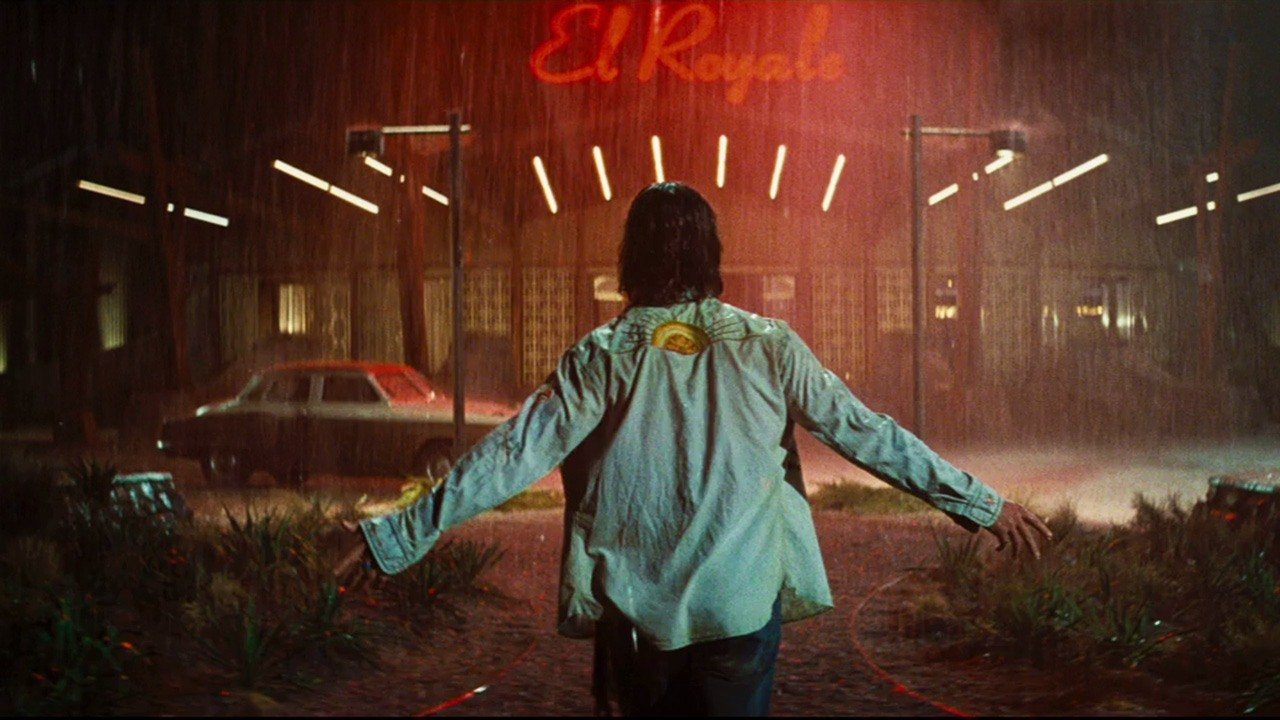
Come out, come out, wherever you are…
Okay, so sure, it’s technically “a story.” There are characters (well, kind of… we’ll get to that in a second), and they all start in one place and end in another. There are changes. Things happen.
But do any of the changes mean anything?
And does anyone care?
I’m not saying you need a larger meaning or an emotional investment in order to have A Proper Story. But without those ingredients, you end up relying on the contrivances of characters making choices based on the whims of the plot rather than their celarly-defined nature in order to hold people’s attention. And when that happens, more often than not, you end up depicting a series of unfortunate events that mostly serve as an excuse for showy camera work and art direction, rather than a story the audience is watching for more than just logistical closure.
Or, in other words: when you try to deconstruct a Quentin Tarantino-style ensemble caper film, make sure you’re deconstructing more than just the dialogue and camera work.
These Aren’t Characters, They’re Types
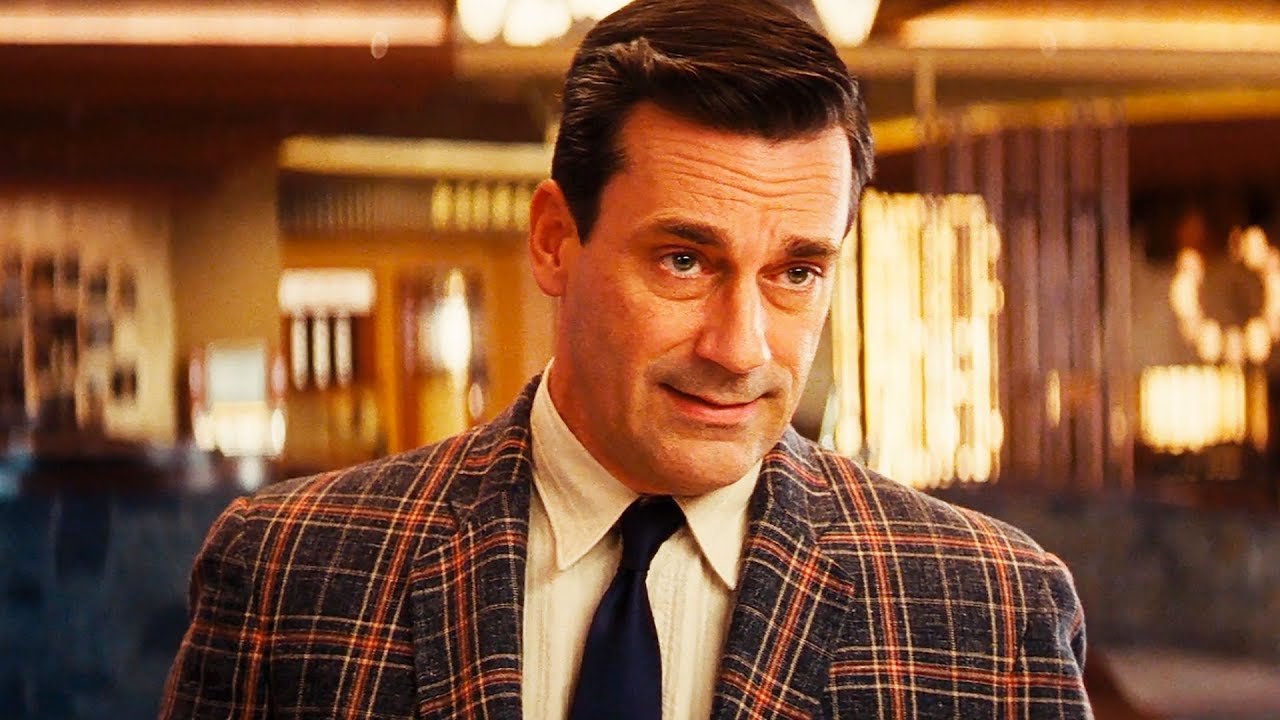
Campbell, I want that new Lucky Strike campaign on my desk by morning.
Given how much Bad Times at the El Royale seems to be channeling Tarantino, it seems like Goddard must have told each of his actors to be Maximum Personalities at All Times.
This results in the cast potraying instantly recognizable types, like the Very Grizzled Con with a Heart of Gold (Jeff Bridges), the Virtuous Woman Who Can Do No Wrong (Cynthia Erivo), the Squirrely Guy with Lots of Secrets (Lewis Pullman), the Disaffected Object of Desire (Dakota Johnson), and Jon Hamm as Foghorn Leghorn.
As such, if you have trouble caring about any of these characters, don’t worry. I don’t think you’re supposed to. Instead, I think you’re supposed to be enraptured by the diabolical plot engine they’ve been dropped into, in which the twists and turns themselves are enough to keep you glued to the edge of your seat.
Except…
This Movie Is Surprisingly Low on Twists and Turns

Shit happens. Get the whiskey.
Here’s a weird situation:
If you’ve seen the trailer for Bad Times at the El Royale, you’ve literally seen most of the film’s spoilers.
Is Jon Hamm not actually who he says he is?
Is Jeff Bridges’s character not really a priest?
Are there secret rooms hidden in the El Royale?
Is someone ripping up the floorboards in one of the motel rooms in search of something?
Does charismatic psycho Billy Lee (Chris Hemsworth playing “Charles Manson, but sexy”) show up to menace the hotel’s guests?
Yes indeed, all of these things are true. Yet the film plays each of those moments as a shocking reveal, or as a payoff to an earlier setup — especially the third act arrival of Billy Lee, which is played for dread for all of five seconds in the movie because the audience already saw it in the trailer.
A film like this only includes that much double-crossing and subterfuge in its trailer because it believes it has countless more twists up its sleeve to keep you riveted in the theater.
But Bad Times doesn’t deliver on that promise. In fact, I’d say it’s the rare film that’s best viewed without watching the trailer, because at least some of those “twists” might play better if you didn’t literally see them coming.
Unfortunately, to fully enjoy Bad Times at the El Royale, you’d also have to watch fewer movies overall. That’s because…
A Double-Inverted Trope Is… Just a Cliché
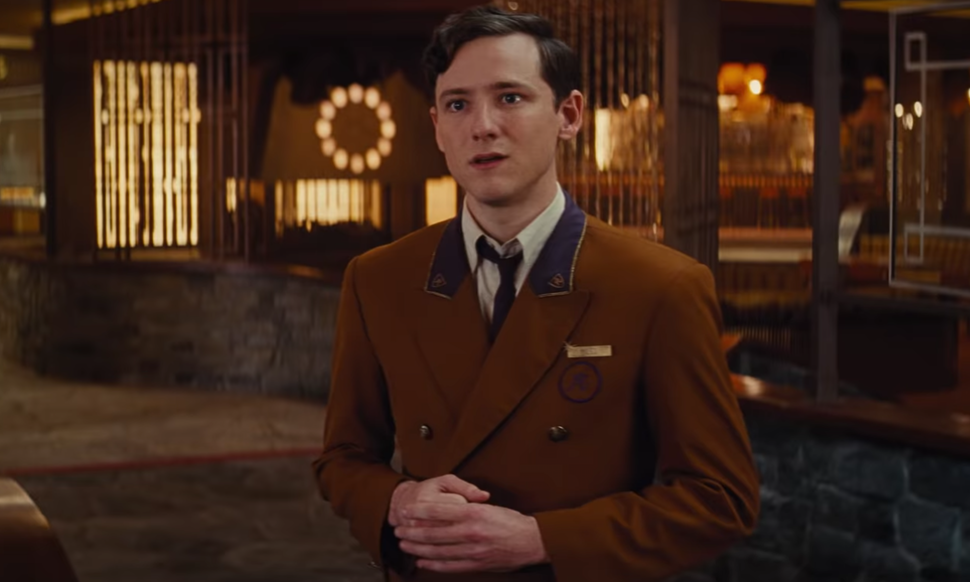
Did someone order a deus ex machina?
Drew Goddard has developed a reputation for being a genre deconstructionist.
Cloverfield is lauded as a genre-bending found-footage sci-fi thriller, while Cabin in the Woods is a deconstruction of the entire thriller genre, and World War Z is a clusterfuck-as-homage to the meta-clusterfuck that is the zombie survival genre.
But with Bad Times at the El Royale, Goddard seems to have inverted himself into a corner. By trying to out-Tarantino Tarantino (and the legion of lookalike structure-warping crime films that boomed in the wake of Reservoir Dogs and Pulp Fiction), Goddard is in a no-win situation.
When Tarantino’s films work best, it’s usually because one or both of the following are true:
- an unexpected, unfamiliar, or contrasting juxtaposition creates a new emotional response in the audience — like the first time you see the “Stuck in the Middle with You” sequence in Reservoir Dogs
- a well-drawn, well-inhabited character faces a challenge that gives us an emotional and a moral justification for choosing a side — and, often, our emotional and moral choices are at odds, which creates both narrative and cognitive tension
Bad Times at the El Royale comes 26 years after Reservoir Dogs, and just 3 years after The Hateful Eight, which it most closely resembles. In that time, we’ve seen the crime genre inverted so often that audiences can now spot future twists two or three plot points early.
Not only that, but the preponderance of Tarantino knock-offs has trained us to do this. We now watch these movies with suspicion, because we know the next twist is right around the corner, so we’re already hunting for it.
You tell me Jon Hamm is a Southern vacuum salesman? I guess that must mean he’s a cop.
You tell me the “bad girl” has a hostage in her trunk? I guess that must mean she’s actually rescuing her.
You tell me there are secret recordings of the goings-on at the El Royale? I guess that must be the MacGuffin endgame that the plot is going to (unconvincingly) revolve around.
Just like J. J. Abrams has conditioned us to view every film or TV series as a mystery box to be solved, we can’t watch a plot unfold at face value without trying to envision every possible twist that every setup could be portending, Littlefinger style.
If only the characters in this film had seen half the films that we in the audience have, because…
This Is a Roger Ebert Idiot Plot
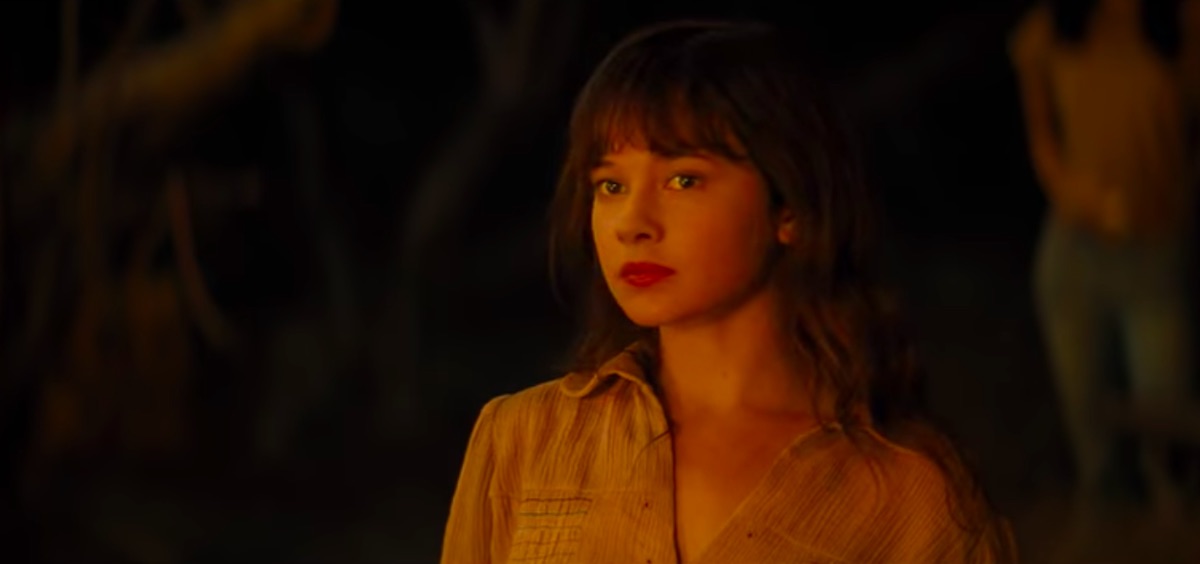
My skills include talking on the phone without my sister noticing.
Legendary film critic Roger Ebert coined the phrase “the idiot plot” to refer to “any plot containing problems that would be solved instantly if all of the characters were not idiots.”
Uncharitable as that description is, it’s also accurate for the plots of most sitcoms and at least half the blockbusters released during any given summer. Most of these story conundrums revolve around a lack of communication, conclusions that are hastily jumped to, information that is inexplicably withheld, and characters denying or obscuring their own nature for the sake of advancing the plot only to remember their true selves when it’s convenient. Worse, almost all of the tension in an idiot plot could be resolved by a character asking just one more question, or noticing one more detail, or calling for backup.
Does the girl kill the only witness to her crime when she has the chance? No, she sits and talks with him because it gives him a chance to deliver a Tarantino-lite monologue while burning time before The Next Twist.
Does the cop, who has specifically been told to Not Get Involved, get involved anyway? You bet your rain-soaked hero montage he does.
Does the villain keep his captives alive so he can grandstand rather than taking the money and running? Friend, have you seen the trailer for this movie?
There tend to be three big reasons that these things happen in a movie: either the writer doesn’t realize they’re clichés (which I have to believe Goddard does), or they’re being done on purpose to support or subvert the genre (neither of which happens convincingly enough here), or the third and most frustrating reason…
The Movie Is So Captivated by Itself That It Believes You’ll Be Equally Infatuated With It
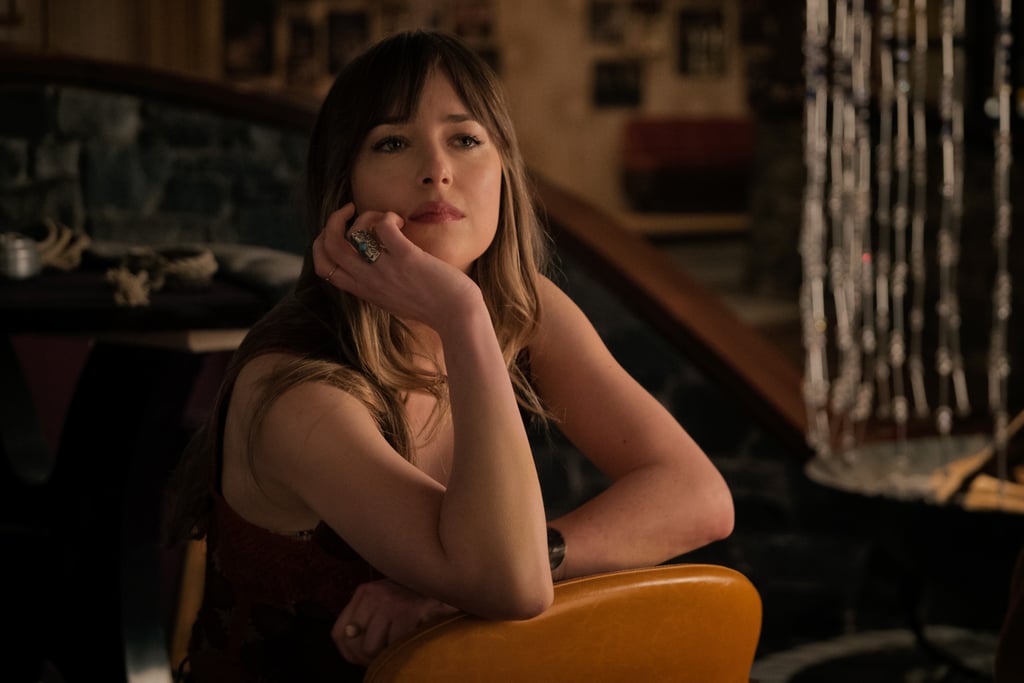
Fifty shades of bae
There’s a scene in Family Guy where Peter’s kids can’t believe he doesn’t like The Godfather but he remains steadfast in his reason why he believes that film is overrated: “It insists on itself.”
I think about that quote a lot when I’m watching a 10-hour streaming series that would have worked better if it had just swallowed its own self-fascinated pride and rewritten itself as a 2-hour movie… or when I’m watching a 2-hour movie that would have worked even better as a short film.
Bad Times at the El Royale is two and a half hours long, and at least half of that time is spent watching actors chew the scenery like it’s a bottomless buffet… or retelling plot points that we’ve already seen from new perspectives that are supposed to dazzle us with their multilayered ingenuity… or having characters talk and talk and talk without ever truly saying anything. (The film even mocks itself for this trait in the final act, thus ensuring that all of its postmodern bases are covered.)
The movie seems to believe that you want to watch attractive people in stylish wardrobes say and do cheeky things while dancing with death. And on paper, that probably sounds great. There’s a reason some of the hottest actors on the planet signed up for this film, and if I had to guess, I’d say Bad Times at the El Royale is the kind of script that works like magic on the page… but that magic evaporates once the pieces are in motion onscreen and a real live audience starts deconstructing its every move.
Don’t Give Your Audience Time to Wonder What the Hell Is Going Wrong
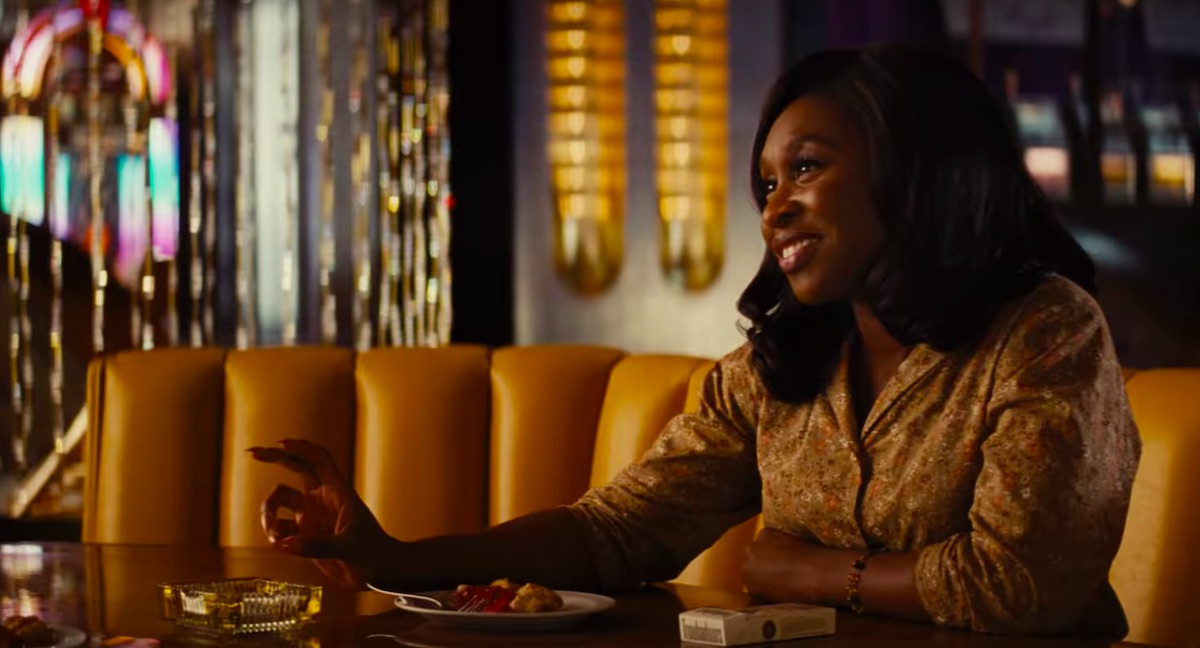
You’re just too good to be true…
Look, no film is perfect, and every plot has some holes. The way most fillmmakers get past this is by moving so quickly that the audience doesn’t have time to say “heyyyy, wait a second” before the next twist happens. The longer a scene drags or a twist takes to play out, the more time viewers have to start twiddling with the plot’s loose ends and realizing they don’t all add up.
But with El Royale being an exercise in self-fascination, it does the exact opposite.
The most mystifying example of the film’s disconnect between what the story needs, what the characters want, and what the audience is expected to pay attention to is what happens during the many, many, many times the film simply… stops… and we just watch Cynthia Erivo’s character Darlene Sweet sing.
For a long time.
Usually while everyone is standing still, and not much else is happening.
Characters who are literally in the midst of making life-or-death choices are so transfixed by hearing Darlene’s voice that they stop what they’re doing and just… listen.
Not only does this warp the film’s sense of pacing, but it also places a confusing focus on Darlene as both a character and a talent. A cop stops his investigation to watch her sing. A killer stops her escape to watch her too. We’re even led to believe that Father Flynn (Jeff Bridges) is so enamored with her voice that he’s falling in love with her.
Is Darlene supposed to be the film’s embodiment of virtue? Is her pursuit of earthly success by using her God-given gifts supposed to be the outcome we’re rooting for as she’s trapped in this den of liars and thieves? Does she serve as the counterpoint to these rogues, and their opportunity for redemption?
In more assured hands, maybe. But in Bad Times at the El Royale, nothing is ever explicitly clear.
In one flashback, Darlene rejects the advances of a slimy L.A. music producer who insults her talent… but the way that scene is written, I couldn’t help but wonder: is Darlene’s voice supposed to sound less than ideal? Judging by everyone else’s reaction, I’m guessing the opposite. But if that producer were as good as his reputation implies, surely he would have promoted her on the spot… or, surely she could make a living somewhere other than the dinner shift in Reno? Why are these her only two options?
Complicating this point further, when Billy Lee demands that Darlene sing for him, he cuts her off shortly after she starts, saying “I’ve heard better.” Is this just a film about white dudes not appreciating black women? Or about the ways corrupt men react when they feel threatened by true talent and virtue?
Like I said, it’s not clear.
And, like one of Tarantino’s typically ambiguous endings, maybe that’s the point?
But with Tarantino, you always know what he’s going for. With Goddard, you only know what he’s veering away from. And when we’re trained to always expect one more payoff, not getting a meaningful one we didn’t already see coming is the worst kind of double-cross.
Despite occasional moments of brilliance from the cast (particularly Bridges and Pullman), this jumble of scenes that may have looked great on paper simply got lost in translation on their way to the screen.
Bad Times, indeed.
Liked This Post? Want More?
Share this post on Facebook or Twitter! ( More shares + more views = more new posts 
Subscribe to my newsletter and you’ll never miss a new post. (I email it weekly-ish.)
Check out similar posts, like the biggest story problems in Jurassic World: Fallen Kingdom, or the real reason Pulp Fiction works so well.
The Biggest Story Problems in Jurassic World: Fallen Kingdom


1 Comment
david · February 11, 2021 at 12:05 am
THANK you. (insert steve carell’s table banging thank you gif here) I just pained myself through those 2.5 hours of beautifully shot scenes of wasted talent. SO disappointed. CIA story? loose end. Who shot Nick Offerman? loose end. Who did Rosie kill with that knife on the lawn? loose end. Who owns the hotel and has Miles spy on guests? loose end. so much anticipation is built up, just to have a completely misplaced Thor waltz in the door — who btw has no stakes in the whole thing whatsoever, to just randomly kill people off, and all of a sudden i’m supposed to root for them?!
Thank you, good sir, Mr. Kownacki for your article. How is the internet full with more or less half-impressed to not so impressed reviews? Yours was the first and only piece I found telling it like it is! “This is not a story! These are not characters!” Style over substance to the bitter end. And i mean the talent on this… not only starring, also DOP McGarvey, composer Giacchino, prodcution designer Martin Whist, i mean. MAN!
so i’m meaning to say: thank you, it’s very comforting and satisfying to find someone out there eloquently stating what is wrong with this film.
you have a good day, sir.